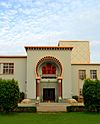Shibli Nomani: Difference between revisions
No edit summary |
No edit summary |
||
| Line 44: | Line 44: | ||
[[Category:Hanafis]] |
[[Category:Hanafis]] |
||
[[Category:Muslim scholars of Islam]] |
[[Category:Muslim scholars of Islam]] |
||
[[Category:Muhajir]] |
|||
[[Category:Urdu-language writers]] |
[[Category:Urdu-language writers]] |
||
[[Category:Modern Indian philosophers|Nomani, Shibli]] |
[[Category:Modern Indian philosophers|Nomani, Shibli]] |
||
Revision as of 05:17, 31 August 2007
Shibli Nu'mani was an British Indian Muslim scholar (1857 - 1914). He collected much material on the life of Muhammad, but could write only first two volumes of the planned book Sirat-un-Nabi. His disciple, Syed Suleman Nadvi, made use of this material and added his own and wrote remaining five volumes of the book after the death of his mentor.
He went to Makkah for the Hajj and there he devoted his time to furthering his studies in Muslim theology, history, philosophy and Sufism from different scholars in Arabia. An orthodox Hanafi Muslim, he was a staunch supporter of the Shari’a and an opponent of the Wahhabi movement.
When he returned to India he met Sir Syed Ahmed Khan (1817-1898) who had just established Aligarh Muslim University. Nomani was offered and accepted a teaching position at the university. He taught at Aligarh for sixteen years where he met Thomas Arnold and other British scholars from whom he learned first hand modern Western ideas and thoughts. He traveled with Thomas Arnold in 1892 to Syria, Egypt, Turkey and other countries of the Middle East and got direct and practical experience of their societies. His scholarship influenced Thomas Arnold on one hand and on the other he was influenced by Thomas Arnold to a great extent, and this explains the modern touch in his ideas.
After the death of Sir Syed Ahmed, he left Aligarh and became an advisor in the Education Department of Hyderabad State. He initiated many reforms in the Hyderabad education system. From his policy, the Osmania University of Hyderabad adopted Urdu as the medium of instruction. Before that no other university of India had adopted any vernacular language as the medium of instruction in higher studies. In 1908 he left Hyderabad and went to Lucknow to become the principal of Nadwat tul-‘Ulum (Nadwa). He introduced reforms in the school's teaching and curriculum. He stayed at the school for five years but the orthodox class of scholars became hostile towards him, and he had to leave Lucknow for his birthplace, Azamgarh, in 1913.
Earlier at Nadwa he wanted to establish Darul Musannifin or the House of Writers but there he could not do this. He bequeathed his bungalow and mango orchard and motivated the members of his clan and relatives to do the same and succeeded. He wrote letters to his disciples and other eminent persons and sought their cooperation. But the first formal meeting of the institution was held on November 21, 1914, within three days of his death.
Shibli was a versatile scholar in Arabic, Persian and Urdu. He was also a poet.
Shibli’s genius had its flowering in Aligarh University when he came into contact with Sir Syed Ahmed and British scholars. But Shibli and Sir Syed were poles apart. Sir Syed Ahmed wanted to adapt Islam to Western thinking and style, while Shibli wanted to adapt Western thinking and style to Islam, though both desired the welfare of the Muslims. Sir Syed wanted to save the Muslims from the wrath of the British rulers after their active participation in the War of Independence, called the "Sepoy Mutiny" by the British colonialist rulers. Shibli wanted to make them self-reliant and self-respecting by regaining their lost heritage and tradition.
Shibli was a supporter of Pan-Islamism. He wrote poems and articles decrying the British and other Western powers when Turkey was defeated in the Balkan Wars and he urged the world Muslims to unite. In 1913, when the British Administration in India stormed the Kanpur Mosque, Shibli condemned them.
Allama Shibli had two daughters and only one son, Hamid Hassan Nu'mani. He was born in 1882 and died in 1942. He had no sons but five daughters. They were: Nasim Jehan, Shamim Jehan, Tahsin Jehan, Mohsina Sultana, and Momna.
Books
Shibli was well aware of the progress of science and education in the West. He wanted to inspire the Muslims to make similar progress by having recourse to their lost heritage and culture, and warned them against getting lost in Western culture. In keeping with this goal, he wrote the following books;
- Sirat an-Nu'man,
- Al-Faruq,
- al-Ma’mun,
- al-Ghazali,
- Imam Ibn-e-Tamia (Edited by Mohammad Tanzeel-ul-siddiqi al-husaini ),
- Mawlana Rumi
- Sirat an-Nabi.

